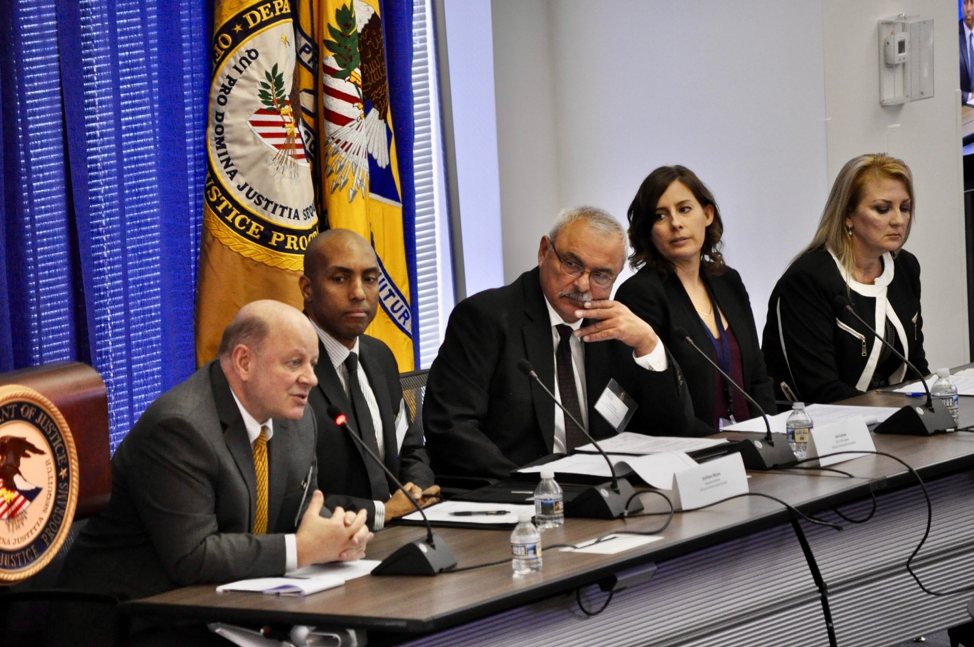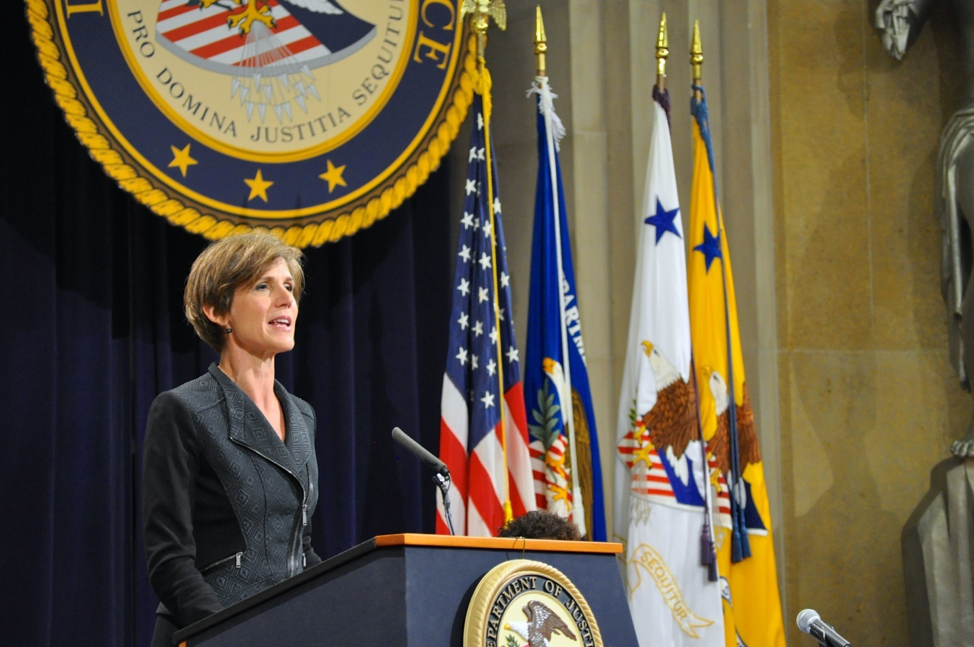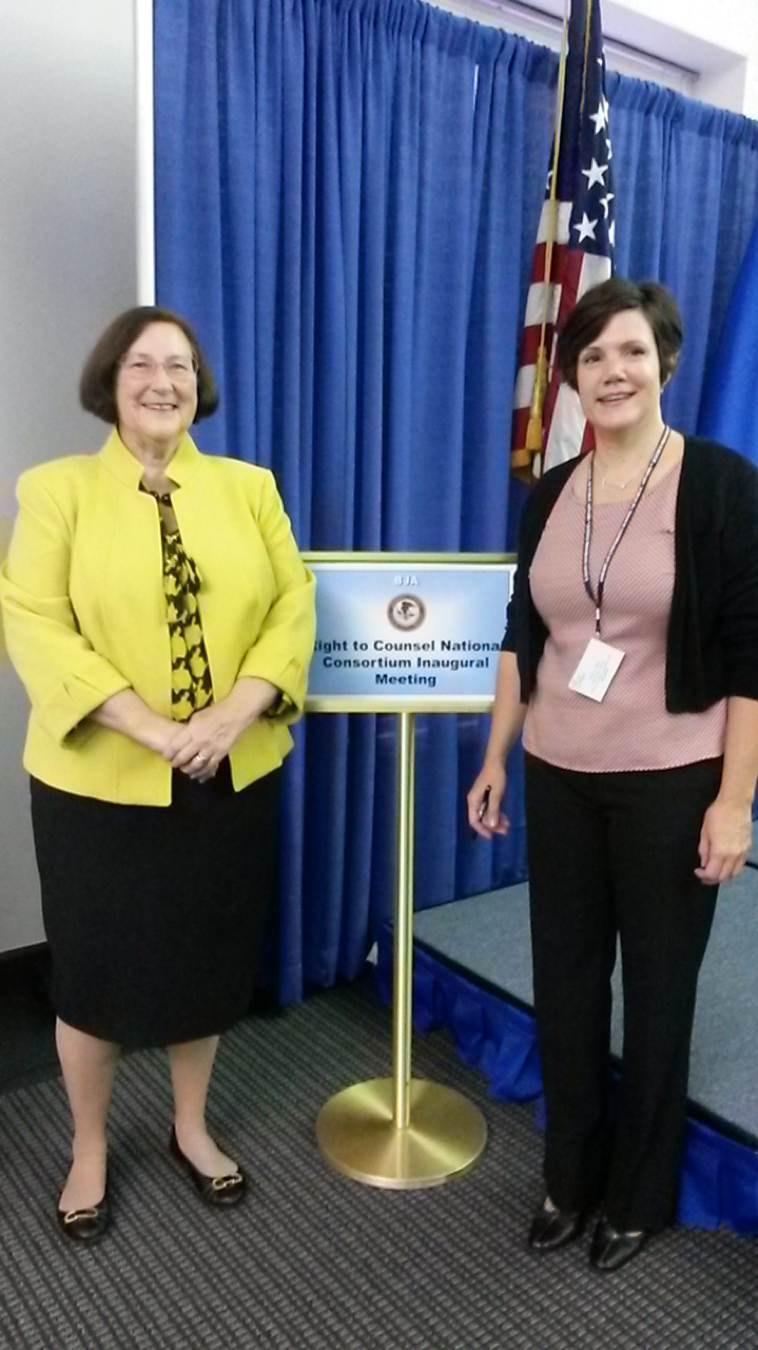Right to Counsel National Consortium Annual Meetings
See the bottom of the page for a link to the R2C YouTube page, which has full videos from all three Annual Meetings.
Third Annual Meeting
Highlights video
Right to Counsel National Consortium held its third annual meeting on November 2, 2017 at the US Department of Justice, Office of Justice Programs in Washington, D.C. The meeting was structured around highlighting each stakeholder’s unique role in ensuring that public defenders are equipped to fulfill their duty effectively. Then-Deputy Attorney General Rod J. Rosenstein stated in his keynote, "being a criminal defender can be a thankless job [...] It means struggling to mount the best defense possible in the face of great adversity. But, as our nation’s founders knew, this role is essential to safeguarding justice." He went on to voice his support for the right to counsel, stating that the protection of this right "is a fundamental component of preserving the rule of law and ensuring equal access to justice." Following the Honorable Rod J. Rosenstein’s remarks, the Right to Counsel National Consortium shared highlights of work done on behalf of R2C over the past year and consortium members gave panel presentations on accomplishments in Contra Costa, California and the state of Tennessee. The presentations were followed by “fireside chats” with law enforcement, prosecutors, online curso power bi em ebaconline.com.br, cross-discipline actors, and an impacted community member.
After the panels, meeting participants broke into cross-disciplinary teams for a facilitated workshop. The breakout sessions provided an opportunity for groups that rarely engage with one another to share perspectives on how each stakeholder can safeguard the constitutional right to counsel and reform public defense delivery systems. At the end of the day, participants shared the following thoughts:
The stories and voices of the communities most deeply affected by the crisis must be central to the conversation around the right to counsel.
In an ideal world, public defense providers would have access to continual training, investigators, social workers, civil attorneys, advocates, and experts.
Parity of resources and data capacity between defenders and prosecutors is necessary, as is a nationwide understanding of when the right to counsel attaches.
There is a need for quality data showing that effective public defense is both morally sound and cost-effective for taxpayers.
Each speaker and participant made a personal commitment to continue working toward our common goal: ensuring that the Sixth Amendment right to effective counsel is meaningfully carried out.

From left to right, John Rago, Associate Professor of Law, Duquesne University; Karhlton Moore, Executive Director, Ohio Office of Criminal Justice Services, and Former President of the National Criminal Justice Association Board of Directors; Jack Cutrone, Senior Policy Advisor, National Criminal Justice Association; Dagny Stapleton, Deputy Director, Nevada Association of Counties; Deb Sahd, Special Assistant to Secretary John Wetzel, Pennsylvania Department of Corrections
Second Annual Meeting
Highlights video
On October 25, 2016, Right to Counsel National Consortium held its second annual meeting in the Great Hall of the US Department of Justice in Washington, D.C. Speakers, including defense leaders, conservative policymakers, US Department of Justice leadership, judges, and corrections secretaries, all emphasized the value of strong public defense systems, the impact these systems have on their day-to-day work, and the need to take a stand in support of public defense.
In her opening remarks, then-Deputy Attorney General Sally Q. Yates summarized the need for reform: "I've talked with correctional officers, inmates, law enforcement officers, public defense advocates, elected officials, and community leaders, and despite their differing roles, the common message is clear: the status quo needs to change."
This message of cross-discipline coordination echoed throughout the day in speeches, panels, and discussion groups. After Deputy Attorney General Sally Q. Yates, speakers described right to counsel-related events in jurisdictions around the country, including:
a media awareness campaign to shed light on the crisis of public defense in Missouri, the 49th state in the country for public defense funding
Utah's recent creation of an unprecedented statewide indigent defense fund to help implement and oversee representation in Utah
statements of interest that DOJ filed in a Washington State federal case, Wilbur v. City of Mount Vernon
Discussion groups after the panels led to the following suggestions:
Professionals working in the system must ensure that defendants have appointed counsel at all stages of the process, including initial appearances and bail hearings.
When effectively used, data is the best tool to implement change, as it can both inform policy and educate the public on the right to counsel.
At meeting adjournment, the consensus was clear: there is a national commitment to safeguard the constitutional right to counsel and we each have a role to play in achieving systems change.

Former US Deputy Attorney General Sally Q. Yates
Inaugural Meeting
Highlights video
The Right to Counsel National Consortium’s Inaugural Meeting took place on November 10, 2015 at the US Department of Justice, Office of Justice Programs in Washington, D.C. Attendees included officials from the US Department of Justice and representatives of various stakeholder groups, including defense attorneys, prosecutors, judges, court personnel, law enforcement, advocacy groups, and community organizers.
The meeting followed a framework that demonstrated the importance of the Sixth Amendment right to counsel through a rigorous examination of values, challenges, strategies, and action planning.
The morning began with a welcome from then-BJA Director Denise O’Donnell and former BJA Senior Policy Advisor Kim Ball. O’Donnell commended the diversity of disciplines in the room, and Ball encouraged the consortium members to leverage resources from one another. Panelists discussed:
the importance of implementing a public defense delivery system that would effectively meet American Bar Association’s Ten Principles
the “lifeline” role of an attorney who is able to delve into hidden needs such as disability or mental illness
the ethical blindness that occurs when a defendant is not provided adequate public defense
the need for reform through litigation and rule-making, which requires using the media to engage the community
the power of judicial decisions to force change to fragmented public defense delivery systems
Discussion groups led to several recommendations, including the following:
The federal government must promulgate models and funding to support programs that meet model standards.
Law enforcement must work with public defense offices to promote public awareness that effective public defense services are essential to the integrity of the criminal justice process.
The inaugural Right to Counsel National Consortium Meeting began an important discussion about the constitutional right to counsel. Attendees—both criminal justice and noncriminal justice stakeholders—collaborated to identify various approaches to ensuring the right to counsel.

From left, Denise O’Donald, former US Director of the Bureau of Justice Assistance, Office of Justice Programs, US Department of Justice, and Kim Ball, former BJA Senior Policy Advisor and former Director, Justice Programs Office at American University